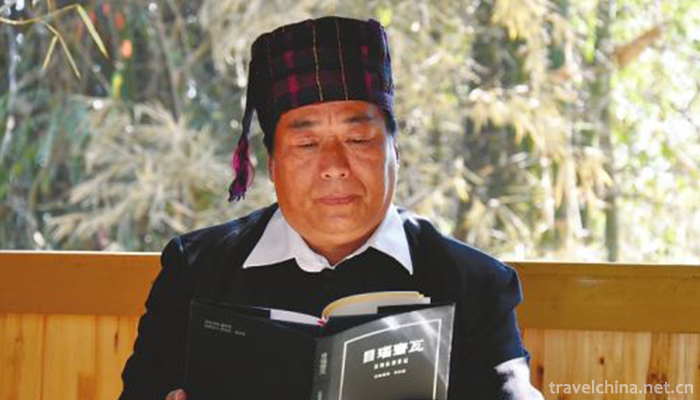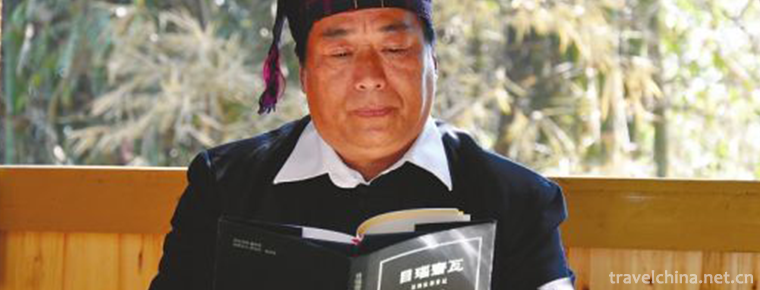Munaozaiwa
Munaozaiwa
Mu Nao Zhaiwa is a living history of Jingpo people's word-of-mouth. It is also a literary masterpiece of poetry style that has been passed down and inherited from generation to generation.
In May 2011, Munaozaiwa declared by Dehong Dai Jingpo Autonomous Prefecture of Yunnan Province was listed in the third batch of national intangible cultural heritage list with the approval of the State Council.
historical origin
Historically, Jingpo people have no written language. Their history of survival and reproduction in the long history is mainly handed down orally. The epic "Munao Zhaiwa" is not only a precious historical material preserved by Zhaiwa people of all dynasties, but also a thread of ancient history of Jingpo people can be explored from it.
artistic characteristics
Its rhythm and rhythm are neat, and its language is beautiful and neat. Historically, the Jingpo people had no written language. They multiplied and survived in the long history, mainly through oral transmission. The epic "Munao Zhaiwa" is not only a precious historical material preserved by Zhaiwa people of all dynasties, but also a thread of ancient history of Jingpo people can be explored from it.
Current situation of inheritance
Starting from the creation of heaven and earth, it records the development and evolution of Jingpo people from ancient times to modern times in the form of beautiful myths and stories. It can be roughly divided into seven parts: the formation of heaven and earth, the uniform of heaven and earth, the breeding of all human beings, the leveling of heaven and earth in Ningguan Duwa, the era of flooding, the marriage of dragon girls and clans in Ningguan Du, the vivid description of production and life, etc. There are five or six kinds of books of Munaozaiwa collected now, but they are only slightly different because of the differences between the regions where they are spread and the singers. In March 1982, by the renowned Zhaiwa (wizard) Gong Tuigan (also known as Shawanfu) of Jingpo Nationality, the inspector of the state government and the famous scholar of Jingpo Nationality, Li Qianqian used Jingpo Wen to arrange, and Yunnan Nationality Publishing House published a more complete book with more than ten thousand lines. Hou Li Qian translated it into Chinese with Shi Rui, a member of the 10th CPPCC National Committee, a professor of Jingpo nationality in Yunnan University for Nationalities, and Chen Hong, a poet of Jingpo nationality, published by Dehong National Publishing House.
Inheritance Significance
As a grand national festival of Jingpo nationality, Munao Longko is held every time with thousands of people coming to participate. People dance in circles, singing and laughing, and the atmosphere is warm and warm. In the dance, people forget the stumbling in the past year's life and pray for the new year with a happy and sacred mood. Jingpo compatriots are immersed in the sacred atmosphere of Zhaiwa reciting Munao Zhaiwa, feeling the difficulties of their ancestors'entrepreneurship, expressing their feelings of remembering their ancestors and gods, understanding their own national history, listening to the voices of history and so on. This activity can not only soothe people's soul in Zhaiwa's pious recitation, but also increase the feeling of friendship and mutual assistance between people, and enhance national pride and cohesion.


-
1.Vinegar garden in East Lake
Donghu Vinegar Garden is located at No. 26 Madaobo between Dongshan Expressway and Jianbei Road in Taiyuan City. It covers an area of more than 20,000 square meters. Shanxi is most famous
Time 2018-12-20 -
2.Buddhist Cultural Tourist Area of Great Buddha and Zen Temple
As the first door to worship Mount Emei, the Buddha Zen Temple is the first stop to pray and worship in Emei, and it is also a must-go place. The Grand Buddha Temple, formerly known as the Grand Buddh
Time 2019-01-06 -
3.Fish Swallow in Bazhen Fresh Soup
Ingredients: Six or two fish swallows are served well. Lentinus edodes, crab willow, Jinhua ham, clam, shrimp
Time 2019-03-27 -
4.Huaihai Opera
Huaihai Opera, one of the national intangible cultural heritage, is a local traditional drama in Huaian City and Lianyungang City of Jiangsu Province.
Time 2019-05-04 -
5.Cutting Copper Dus Cutting Copper
Painting inscriptions on bronze pots, smooth lines; beautiful paintings of mountains and rivers on bronze plates, such as immersion... In many people's eyes, Du's bronze engraving,
Time 2019-05-09 -
6.24 solar terms of the lunar calendar
Twenty-four solar terms is a supplementary calendar that absorbs the "twenty-four solar terms" of the Ganzhi calendar to guide agriculture. It is the accumulation of long-term experience and
Time 2019-06-08 -
7.Qiangge war
The Battle of the Qiang is the most famous one among the folk epics of the Qiang people. It describes the history of the ancestors of the Qiang people who had experienced hardships and hardships
Time 2019-06-10 -
8.Production Techniques of Tongshengxiang Beef and Mutton Bubble
Tongshengxiang steamed beef and mutton steamed bun was founded in 1920. It was named Tongshengxiang with the meaning of "prosperity and auspiciousness". Its steamed bread is made of meat of
Time 2019-06-21 -
9.Xingguo Folk Song
Xingguo Folk Song has a long history. It is said that it was sung by woodcutters who built A Fang Palace in Xingguo in the late Qin Dynasty. Xingguo folk songs are lively, diverse in form and full of
Time 2019-07-08 -
10.Yangzhou Tanci
Yangzhou's performance of ci-poems is mainly based on speech and supplemented by singing and playing. The representative bibliographies are "Double Gold Ingot", "Pearl Tower", &quo
Time 2019-07-10 -
11.Guanyin Pavilion
Stand on Ezhou The city's Xiaodong gate dike overlooks the Yangtze River, and a huge reef stands in the center of the Yangtze River. Long pan Ji " It is also known as "Wanli Changjiang first
Time 2019-09-20 -
12.Deyang medical and health
By the end of 2018, Deyang City had 2819 health institutions (including village clinics), including 7 centers for Disease Control and prevention, 7 health supervision institutions, 1 Emergency Center (station), 6 maternal and child health centers,
Time 2020-12-14